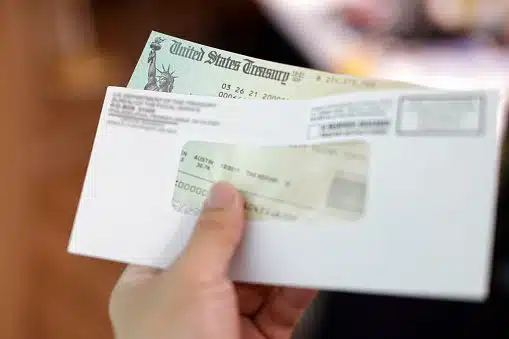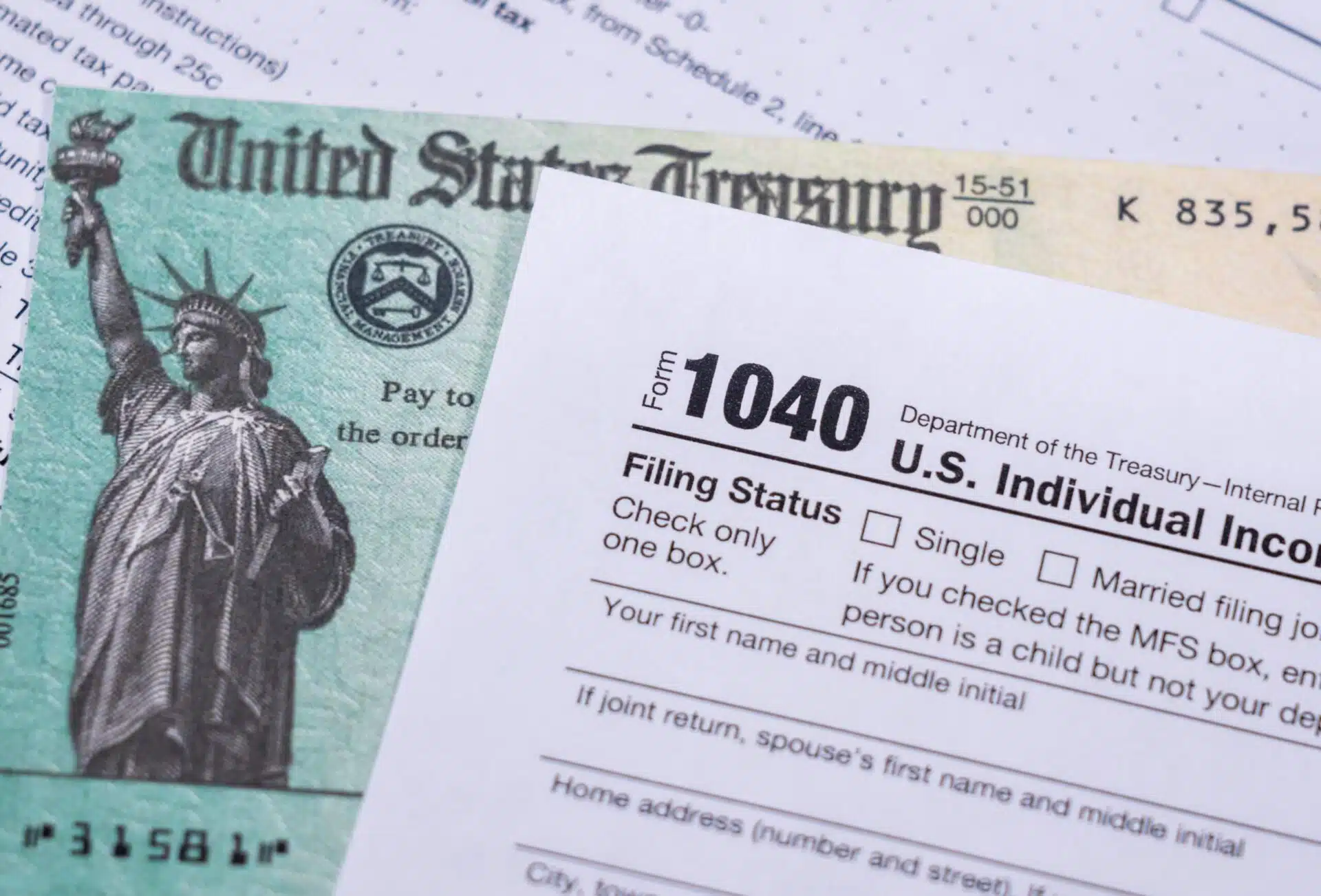Protecting yourself from Phony IRS Scams

Are you worried about falling victim to deceptive Phony IRS scams? Take action and protect yourself against fraudsters pretending to be from the Internal Revenue Service. Every year, millions of Americans receive fraudulent requests for personal information or money, often targeting vulnerable individuals who don’t understand tax filing laws and regulations. This blog post will share tips on identifying fake phone calls and emails claiming to come from the IRS. If you encounter any suspicious emails or phone calls claiming to be from the IRS, it is important to report them to the Federal Trade Commission.
The FTC Complaint Assistant on FTC.gov is a useful tool for reporting such scams. By reporting these scams, you can help the Federal Trade Commission in their efforts to combat fraudulent activities. The Federal Communications Commission’s Smartphone Security Checker is a useful tool against mobile security threats. If you are a business or payroll service provider, you may also be asked to file a report with your local law enforcement. Businesses/payroll service providers should file a crime complaint with the FBI’s Internet Crime Complaint Center (IC3.gov). Read on for more useful information!
Taxpayer-Focused Scams: Protect Yourself Today from Fraudulent Activities
Scammers are Targeting You with Pandemic-related Email Scams
The IRS, state tax agencies, and the tax industry have warned about a new wave of phishing scams targeting tax professionals. These scams use pandemic-related themes to trick unsuspecting individuals into divulging confidential client data. Taxpayers must stay vigilant and protect their personal information.
Phone Scammers are Highly Active During Tax Season:
Taxpayers should be aware that phone scammers are particularly active during tax season when they aggressively target taxpayers with fake calls and emails claiming to be from the IRS. These scammers often pose as IRS agents or attorneys to trick unsuspecting victims into revealing sensitive financial information and stealing taxpayer money. Unfortunately, these schemes are becoming more frequent and sophisticated every year, so taxpayers need to take steps to protect themselves from fake communications. “The IRS is seeing signs of two new variations of tax-related scams,” said IRS Commissioner Danny Werfel. “One involves Social Security numbers related to tax issues and another threatens people with a tax bill from a fictional government agency.”
The IRS is urging taxpayers to stay vigilant and report any suspicious activity to help combat these scams. Additionally, taxpayers should also be on the lookout for a new scheme involving a mailing coming in a cardboard envelope from a delivery service. The enclosed letter includes the IRS masthead and wording that the notice is “in relation to your unclaimed refund.”
Think Before You Click:
Phishing emails can appear legitimate, but clicking on them could lead you straight into a scammer’s hands. Common signs of a phishing email include spelling errors in the subject line or body of the message, links that don’t look like those typically used by the IRS, requests for personal information, and unsolicited emails. Taxpayers should never click on links in emails they weren’t expecting and should always report suspicious phishing emails to the IRS immediately. It is important to note that when reporting these scams, individuals should include the caller ID (email or phone number), date, time, and time zone, as well as the number that received the message.
Additionally, individuals should be cautious of emails claiming to be about their tax refund, as scammers may use the guise of a tax refund to trick people into providing their personal information. In some cases, scammers may even send fake forms to allegedly claim the refund, so it is crucial to be vigilant and verify the authenticity of any forms received. Individuals should also verify the identity of the sender by using another communication method; for instance, calling a number they independently know to be accurate, not the number provided in the email or text.
Don’t Send Money to Unknown Parties:
Taxpayers should never respond to emails, calls, or text messages asking them to send money. The IRS will never call out of the blue and ask taxpayers to send cash, gift cards, or anything else of value. Furthermore, consider any email or text message requesting a payment a scam and report it to the IRS immediately. It’s important to note that the IRS doesn’t initiate contact with taxpayers on social media channels to request personal or financial information.
The IRS initiates most contacts through regular mail delivered by the United States Postal Service. If you have any concerns or questions regarding your taxes, it is recommended to contact your local IRS office for assistance. Setting up an online account with the IRS can get you access to valuable information, such as your payment history or a tax transcript. You can even sign up for and/or manage an IRS payment plan through the system.
Charity Fraud Information:
Taxpayers should also be aware of charity fraud schemes during tax season, especially those targeting tax-exempt organizations. Scammers often use fake charities to collect donations for nonexistent causes and are particularly active in the wake of natural disasters or other tragedies. If a taxpayer suspects they have been targeted by a scam, they should contact their local state charity regulator to verify the organization’s legitimacy before donating any money.
Identity Theft and Unemployment Benefits:
In 2020, millions of Americans experienced job loss due to the pandemic, leading to the issuance of unemployment benefits by state agencies. Unfortunately, this situation was exploited by criminals who used stolen identities to file for fraudulent unemployment benefits.
As unemployment benefits are considered taxable income, state agencies issue Forms 1099-G, Certain Government Payments, to both recipients and the IRS. This form reports the amount of taxable compensation received and any withholding, with Box 1 showing “Unemployment Compensation.”
If taxpayers receive a Form 1099-G for unemployment compensation they did not receive, they should follow the guidelines provided in the “Identity Theft and Unemployment Benefits” protocol.
Scams Related to Natural Disasters:
In 2020, there were several major disasters in the US and abroad. These events often spawn fraudulent activities from criminals seeking to take advantage of those affected by the disaster.
Taxpayers should be aware of scams related to natural disasters, including:
- Fake charities
- Insurance fraud
- Other schemes use victims’ desperation to commit fraud.
The IRS and other government agencies offer resources to help victims of natural disasters, which can be found on their respective websites. Taxpayers should also take the time to research charities before donating money or goods to avoid becoming a victim of fraud.
File Early:
Taxpayers should file their taxes as early as possible to minimize the likelihood of identity theft or other fraud attempts. Once a return has been filed, it cannot be filed again with the same Social Security Number (SSN), and any subsequent attempts will be flagged as fraudulent.
Additionally, filing early helps taxpayers get their refunds timely and can avoid potential delays due to fraudulent activity. Taxpayers can protect themselves from Phony IRS scams and ensure that they file their taxes accurately and on time by taking the necessary precautions and filing early.
IRS-Impersonation Telephone Scams
The United States Internal Revenue Service (IRS) has recently warned about a sophisticated phone scam targeting taxpayers, especially recent immigrants. The scam involves individuals who pretend to be IRS employees, using fake names and IDs. They usually have some knowledge about their targets and are known to alter the caller ID phone number to make it seem like the call is from the IRS.
Taxpayers who receive these phone calls should: record the number and then hang up the phone immediately. Report the call to TIGTA using their IRS Impersonation Scam Reporting form or by calling 800-366-4484. Report the number to phishing@irs.gov and be sure to put “IRS Phone Scam” in the subject line. The IRS will not call you directly. You can call them…see our list of how to contact the IRS.
The scammers demand payment for allegedly owed taxes, usually via gift cards or wire transfers, and may even threaten victims with arrest, deportation, or suspension of a business or driver’s license. In some cases, they also claim that the victim has a refund due and try to trick them into sharing personal information. The scammers often leave an “urgent” callback request if the call is not answered. However, it is important to note that engaging in fraudulent activities with the intention of obtaining a larger tax return can lead to severe consequences.
More to watch…
Not signing a return is a red flag that the paid preparer may be looking to make a quick profit by promising a big refund or charging fees based on the size of the refund. The IRS could impose substantial penalties, such as a $5,000 fine or even criminal charges, for falsifying information or making up numbers. It is crucial to be aware of ghost preparers, unethical tax return preparers who don’t sign the tax returns they prepare, as they may be seeking to exploit individuals by promising significant refunds or charging fees based on the refund amount.
The scammers have also been known to use video relay services to target deaf and hard of hearing individuals. Interpreters do not screen calls for validity. So, taxpayers should be cautious and not assume that the calls are legitimate.
Individuals who have limited English proficiency often face approaches in their native language from scammers who threaten them with deportation, arrest, or license revocation.
IRS Reminder: Tax Scams Continue Year-round:
Taxpayers should remain vigilant year-round to protect themselves against tax scams. These scams can come from emails, texts, phone calls, or even social media messages.
Taxpayers should only give out personal information such as Social Security numbers, bank account numbers, or passwords over the phone or via email if they are certain they are dealing with a legitimate source. The IRS also recommends using strong passwords and two-factor authentication to protect online accounts.
Also, taxpayers must beware of tax preparer fraud, where preparers use stolen identities or fake deductions to increase refunds. Beware of phishing scams – fake emails and websites from seemingly legitimate sources used to obtain personal information.
Conclusion
Don’t fall for Phony IRS scams! The best way to avoid an IRS scam is to know what they sound and look like. Be on the lookout for anything that seems too good to be true or any caller who tries to threaten you. Remember, the IRS will never call you out of the blue to demand money and will never threaten you with arrest or deportation. However, if you get a call like this, hang up and report it to the Treasury Inspector General’s office, specifically the Tax Administration division. It is important to note that scammers often use scare tactics, such as threatening to involve local police or other law enforcement groups, including the IRS, to intimidate taxpayers into paying.
FAQs
What should you do if you suspect you are being targeted by a phony IRS scam?
If you suspect you are being targeted by a phony IRS scam, do not provide any personal or financial information. Hang up the phone, delete suspicious emails, and report the scam to the IRS by forwarding phishing emails to phishing@irs.gov or calling 1-800-366-4484.
What are some common tactics used by scammers in phony IRS scams?
Some common tactics used by scammers in phony IRS scams include impersonating IRS agents, demanding immediate payment over the phone or through prepaid debit cards, threatening legal action or arrest if payment is not made, and using caller ID spoofing to make it seem like the call is coming from the IRS.
What type of information do scammers typically try to obtain during these types of scams?
Scammers typically try to obtain personal information such as social security numbers, bank account details, and credit card information during phony IRS scams. They may also attempt to trick individuals into making immediate payments or providing confidential information over the phone or through email.
How can you protect yourself from falling victim to a phony IRS scam?
To protect yourself from phony IRS scams, remember that the IRS will never call or email you out of the blue. They only initiate contact through regular mail. If you receive a suspicious call or email claiming to be from the IRS, do not provide any personal information and report it to the IRS immediately.
Read More
2. Federal Tax




